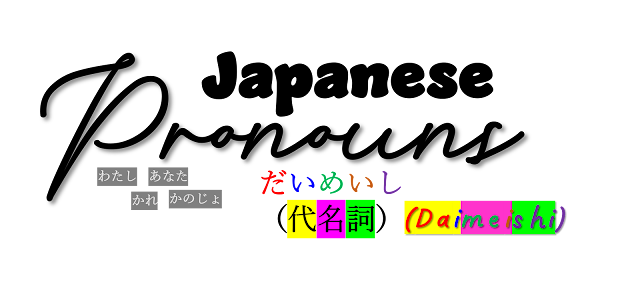In Japan,
pronouns can be omitted in a sentence if both speaker and the person the
speaker is referring to know the context of the sentence. Also, pronouns give
importance to hierarchy, like respect for elders, seniority, or social order. It
denotes the characteristics of the speaker or the person talking to like age, gender,
and their relationships.
Pronoun in Japanese is だいめいし(代名詞)read
as Daimeishi.
Our focus for today’s blog is:
I
You
He
She
We
They
|
Personal Pronoun |
I |
è
This is
the most used Japanese pronoun for ‘I’. It is both formal and informal. Formal
when a male uses わたし in a
sentence but a casual usage for women.
Watakushi わたくし (私)
è
It is both
very formal and polite personal pronouns. Mostly used on official or business
occasions. If you want to be polite, instead of using わたし, you can use わたくし. わたし and わたくし
have the same Kanji.
è
these
pronouns are mostly used by elderly people. For younger ones, this is very
formal.
Atashi あたし
è
It is an altered word from わたし. It is an informal personal pronoun
used by the younger generation mostly young females. Do not use this word when talking
to anyone other than your friends. It is even rude to use this when talking to
one of your older family members.
è
Used mostly by Males. It is an informal word of わたしfor
males. It gives an impression of being
modest when a male uses it. If you are female, do not use this word.
è
This is used by Males only, usually in an informal
setting. But do not use this word when talking to someone older than you or a
person in a higher position. It will be interpreted as rudeness.
|
Personal Pronoun |
YOU |
Anata あなた (貴方)
è
This is the equivalent of You in English. あなた is sometimes omitted in a sentence, and the person’s name is
replaced followed by the honorific suffix. It can be misinterpreted as being
rude when it is used by addressing someone older or person in a higher
position.
è
It can also be translated to ‘Darling’ or ‘dear’
when the wife of a Japanese call him or a woman having or wanting an intimate
relationship with a Japanese man.
Antaあんた
è
A short version of あなた. An impolite or informal way of
saying You. It can only use among close friends.
è
Can only use in an informal setting mostly to
call subordinates or friends. It is inappropriate
when addressing senior people or strangers. The Kanji of きみ is the same as the honorific suffix
when addressing a male’s name.
Omae おまえ (お前)
è
Only used by males. It can be misinterpreted as
rudeness when someone uses this word. Sometimes, husband calls their wives おまえ, a
counterpart of あなた by the wives.
Χ Preferably, avoid using the pronouns below for the word ‘You’.
Kisamaきさま
Temeeてめえ
Temaeてまえ
è
When these words are used, it expresses
hostility toward another person. きさま used to be a formal word but now, it is very rude to use. In anime,
we can always hear these words.
|
Personal Pronoun |
HE / SHE |
Kare かれ (彼)
è
Japanese pronoun for male (He). It can also be translated
as a boyfriend (special male friend) in an informal setting.
Kanojo かのじょ (彼女)
è
Japanese pronoun for female (She). It can also
be translated as a girlfriend (special female friend) in an informal setting.
Plural form of personal pronouns:
When using the plural forms of each pronoun, we need to add the suffix for each pronoun. I will only use formal/informal pronouns.
To
turn a personal pronoun to its plural form, use the suffix ~たち (~達). This
suffix is the most common plural suffix. It can be added to any nouns that
refer to people and animals. The other plural suffixes are ~がた and ~ら.
|
Plural |
WE |
Watashitachi わたしたち (私達)
è
The plural form We. It can be used formally or in
neutral.
Bokutachiぼくたち (僕たち)
è
Plural form of ‘we’ used by males only.
Anatatachi あなたたち/ Anatagata あなたがた
è Plural
form of You. For formal plural use ~がた as the suffix. The usual plural form of ‘you’ is the suffix ~たち.
Karetachi かれたち (彼たち) / Karera かれら (彼ら)
è
Plural form of ‘They’ of male groups.
Kanojotachi かのじょたち (彼女たち) / Kanojoraかのじょら (彼女ら)
è
Plural form of ‘They’ of female groups.
Example:
Ø あなたの出身はどこですか?
(Anata no shusshin ha doko desu ka?)
Where are you from? (Where do you come from)
è Let’s change あなた to a person’s name. We’ll use the name ‘Anna’.
Ø
アナさんの出身はどこですか?
(Anna-san no shusshin ha doko desu ka?)
Ms.
Anna, where do you come from?
Ø 彼は私の恋人です。
(Kare ha watashi no koibito desu.)
He
is my lover.
This is Ringo!
And I'll see you soon!
If you want to check my previous post, you can check it through the link
below:
>> Word of the week
>> Top social media platforms in Katakana Character
>> Japanese House
For Hiragana and Katakana page, please check the link below:
>> The Hiragana Character
>> The Katakana Character
For my Spanish lessons that I am still not fluent and need more effort to study, you can check the link below:
>> 【Spanish Lesson #1】Survival Expressions
>> 【SPANISH LESSON #4】THE VERB “TO BE”
You can also my personal website where I write stories and blog about things I like:
>> Write and Sleep




Comments
Post a Comment